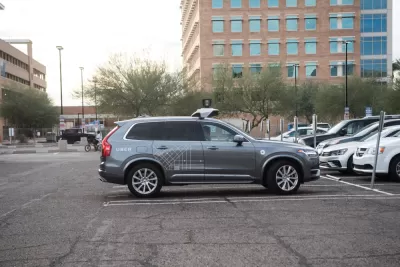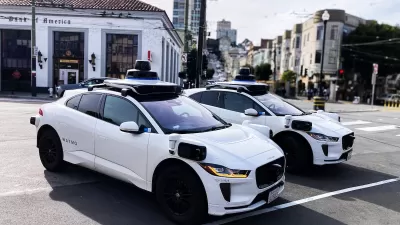Five self-driving car companies are currently operating in Pittsburgh, without much critical rigor in asking about the consequences of the technology to the city.

"The public has been exposed to risks associated with being guinea pigs in an AV lab, yet not a single public meeting has been held to address public concerns," writes Angie Schmitt, to introduce the premise of a new report from Pittsburghers for Public Transit (PPT) intended to raise awareness about the potential negative consequences of handing over the public realm to technological experiments.
More specifically, according to Schmitt, the report "argues that public concerns about equity, the environment and job security aren’t playing a larger role in the conversation about autonomous vehicle deployment."
Then there are questions about safety risks presented by self-driving cars to pedestrians and people on bikes. In addition to the risks exemplified by the first pedestrian killed by a self-driving car operated by Uber in Tempe, "pedestrians and cyclists risk losing funding for essential infrastructure like sidewalks and crosswalks to special street treatments for AVs," according to Schmitt's summary of the report.
"The city of Pittsburgh, for example, allocated $23 million from its 'Department of Mobility and Infrastructure' for testing and deployment of an 'autonomous micro transit shuttle,' which [Laura] Weins, the PPT director, called 'not really mass transit.'"
FULL STORY: Pittsburgh Reveals the Downside of Self-Driving Cars

Maui's Vacation Rental Debate Turns Ugly
Verbal attacks, misinformation campaigns and fistfights plague a high-stakes debate to convert thousands of vacation rentals into long-term housing.

Planetizen Federal Action Tracker
A weekly monitor of how Trump’s orders and actions are impacting planners and planning in America.

San Francisco Suspends Traffic Calming Amidst Record Deaths
Citing “a challenging fiscal landscape,” the city will cease the program on the heels of 42 traffic deaths, including 24 pedestrians.

Defunct Pittsburgh Power Plant to Become Residential Tower
A decommissioned steam heat plant will be redeveloped into almost 100 affordable housing units.

Trump Prompts Restructuring of Transportation Research Board in “Unprecedented Overreach”
The TRB has eliminated more than half of its committees including those focused on climate, equity, and cities.

Amtrak Rolls Out New Orleans to Alabama “Mardi Gras” Train
The new service will operate morning and evening departures between Mobile and New Orleans.
Urban Design for Planners 1: Software Tools
This six-course series explores essential urban design concepts using open source software and equips planners with the tools they need to participate fully in the urban design process.
Planning for Universal Design
Learn the tools for implementing Universal Design in planning regulations.
Heyer Gruel & Associates PA
JM Goldson LLC
Custer County Colorado
City of Camden Redevelopment Agency
City of Astoria
Transportation Research & Education Center (TREC) at Portland State University
Jefferson Parish Government
Camden Redevelopment Agency
City of Claremont





























